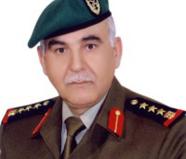 A top Syrian army defector was set to take charge of the rebel army’s operations on Saturday, as the United States accused Iran of supplying munitions to aid Damascus’ bloody crackdown on protests.
A top Syrian army defector was set to take charge of the rebel army’s operations on Saturday, as the United States accused Iran of supplying munitions to aid Damascus’ bloody crackdown on protests.
Washington has reason to believe Iran is supplying security-related equipment “including munitions” to Syrian forces, a US official said late on Friday, after the head of the elite Revolutionary Guards’ Quds force, Qasem Soleimani, visited Damascus earlier this month.
The accusations came after Britain sharply criticised Russia for refusing to support UN Security Council moves against President Bashar al-Assad.
British Prime Minister David Cameron said during a visit to Saudi Arabia that vetoing a Security Council resolution against Damascus amounted to standing by and watching the “appalling bloodshed.”
In October, Russia and China vetoed a Western draft resolution that would have condemned the Assad regime. Russia later circulated an alternative that would have pointed the finger at both sides.
Cameron told Al-Arabiya television on Friday that Britain stands ready to take a fresh resolution on Syria to the Security Council.
He said it would dare “others that if they want to veto that resolution to try to explain why they are willing to stand by and watch such appalling bloodshed by someone who has turned into such an appalling dictator.”
Referring to the alleged Iranian aid to the crackdown by its Syrian ally, an official in Washington said the United States has reason to believe that Iran is supplying security-related equipment “including munitions” to Syrian forces.
The United States has long suspected that Iran has been aiding Syria’s purge as Assad clings to power and tries to avoid the fate of other Arab dictators felled by the Arab Spring uprisings.
Another official said Soleimani’s visit marks the strongest indication yet of direct cooperation between the allies.
Efforts to isolate the Syrian government were boosted by rebel plans to form a high military council headed by a top Syrian army defector that will oversee military operations against President Bashar al-Assad’s embattled regime.
General Mustafa Ahmad al-Sheikh, the most senior commander to defect from the Syrian army, will announce the council’s formation later on Saturday in Turkey, where he sought refuge 12 days ago, his media advisor said.
Sheikh, 54, was in charge of security in northern Syria before defecting. In a statement, he said he had deserted because he was sickened by the ruthlessness of Assad’s regime and all the killings taking place.
“This council, headed by Sheikh, will oversee military operations in conjunction with the Free Syrian Army,” Fahad Almasri told AFP, and will include high-ranking officers who will plan operations to be executed by the FSA.
“It will also help organise defections within the army and will be in contact with officers in the regular army to encourage large-scale rather than individual defections.”
Formed from deserters from the regular army who mutinied over the regime’s deadly crackdown, the FSA says it has some 40,000 fighters under its command.
Thousands rallied in support of the FSA on Friday, after the largest civilian opposition group, the Syrian National Council, which initially opposed the use of force in the uprising, decided to boost its cooperation with the rebel army.
Meanwhile, violence in the flashpoint city of Homs reportedly claimed two lives on Saturday. A 13-year-old child was killed by gunfire at a checkpoint, and 27-year-old man shot by snipers, according to the Syrian Observatory for Human Rights.
Separately, the official SANA news agency said three people were injured when a train carrying fuel to a power station in the restive province of Idlib was hit by a booby trap “laid by terrorists.”
Amid growing criticism of the Arab League observer mission for its failure to end violence that the United Nations says has claimed more than 5,000 lives, League chief Nabil al-Arabi said on Friday the Syria task force would meet to decide the future of the mission, while voicing regret over the bloodshed.
“The Arab League general secretariat is now examining whether it would be beneficial for the mission to pursue its work in light of the continuing violence,” he was quoted as saying by the official MENA news agency.
“Maybe things are a bit calmer but (the violence) continues. The human conscience cannot accept that any person gets killed,” he added.

Leave a Reply
You must be logged in to post a comment.